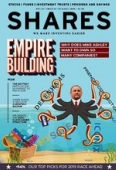Archived article
Please note that tax, investment, pension and ISA rules can change and the information and any views contained in this article may now be inaccurate.
How I invest: still fascinated by the markets at age 73

Twenty one years ago former policeman Peter joined an investment club with seven friends including a WW2 fighter pilot and a few retired businessmen. They treated the club as a casual way of playing the markets because everyone taking part was already sitting on a decent pension or were in well-paid jobs.
‘Our criteria, when choosing shares, was not to be too concerned about dividends. We were quite keen on shares that came with “free” warrants and indeed some warrants in their own right. It was quite a rollercoaster ride, but convivial and fun,’ he remarks.
Fast forward to the present day and Peter says he misses the interaction and decision-making process that made the investment club such an enjoyable experience. Now aged 73, he is still fascinated by the challenge of investing and likes to do the opposite of the crowd.
‘I like to think I am a contrarian investor. I used to follow the herd but now have much more fun reading a buy or sell signal from brokers and if I understand the business, I do my research and buy if it is suggested to sell. Stocks also have to fit my criteria of providing safe dividend cover.’
Peter has stopped investing in actively-managed funds because he says the costs seem too high. Exchange-traded funds (ETFs) are also off the menu but he still dabbles in alternative investments such as gold coins and fine wines.
Ultimately his main focus is on FTSE 100 shares as a source of income. His portfolio includes positions in oil producer BP (BP.), life insurer Legal & General (LGEN), pharma group GlaxoSmithKline (GSK) and utility expert National Grid (NG.). He also holds, among others, shares in Manx Telecom (MANX:AIM) which has just received a takeover bid and
small cap miner Greatland Gold (GGP:AIM).
‘The shares that now fit my buying criteria tend not to be high flyers. Instead they are mostly steady well-run dividend-paying stocks. In my youth I tended to look at FTSE 250 and foreign stocks but no longer. I have done reasonably well on some insurance stocks which were takeover targets and also Vodafone (VOD) when it sold off a subsidiary some years ago.’
It is hard to have success all the time with investing and Peter admits to having a few disappointments, particularly among some AIM-quoted stocks which he claims to have been mis-sold. He says some of his investments on London’s junior market are now virtually worthless and are subject to a Financial Services Compensation Scheme mis-selling claim against a broker.
FOLLOWING A DIFFERENT PATH
A rethink of his career in 1984 saw Peter set up his own vending business. By the time he sold it in 2006 the business employed 13 staff and turned over £1m.
Moving into retirement, a change in personal circumstances saw him move to Eastbourne where he now owns a two-bedroom apartment outright. He draws an income from a ‘reasonable’ occupational pension and the state pension which together cover all of his day-to-day expenses, meals out, holidays and the odd bottle of wine.
Approximately £4,500 worth of dividends from his investment portfolio – currently worth £85,000 – have been reinvested, yet Peter admits he would be prepared to take future dividends as cash should there be an unforeseen expense to pay.
‘I have ISAs and a small SIPP into which I invest annually the basic £3,600 as I no longer enjoy a taxable income. I do not have any long term plans other than leaving any assets, after deducting for possible health care costs, to my two daughters and four grandsons.’
He adds: ‘These days my family have their own advisers and only come to me if the advice they receive has gone wrong. They occasionally pick my brains but I am reluctant to offer specific advice on pure investments that might go wrong.’
DISCLAIMER: Please note, we do not provide financial advice in case study articles and we are unable to comment on the suitability of the subject’s investments. Individuals who are unsure about the suitability of investments should consult a suitably qualified financial adviser.
Important information:
These articles are provided by Shares magazine which is published by AJ Bell Media, a part of AJ Bell. Shares is not written by AJ Bell.
Shares is provided for your general information and use and is not a personal recommendation to invest. It is not intended to be relied upon by you in making or not making any investment decisions. The investments referred to in these articles will not be suitable for all investors. If in doubt please seek appropriate independent financial advice.
Investors acting on the information in these articles do so at their own risk and AJ Bell Media and its staff do not accept liability for losses suffered by investors as a result of their investment decisions.
 magazine
magazine










